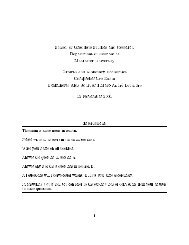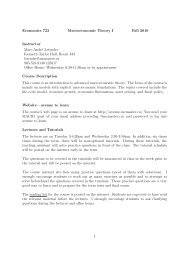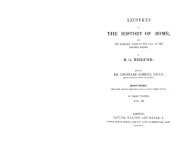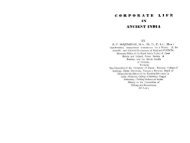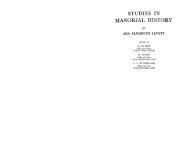egarded as a great sc<strong>an</strong>dal to a lord, that two of hisdepend<strong>an</strong>ts should be at feud1. Bribes are offered <strong>an</strong>dlooked for as a matter of course2, it is assumed that <strong>an</strong>officer will use his official position in favour of his friends<strong>an</strong>d the only hope of redressing evils is considered to lie inthe influence of the great. <strong>The</strong> issue of a lawsuit is boundup with the fate of parties4; <strong>an</strong>d the aim of all is to beupon the stronger side5. We see here the almost royalstyle in which the great lords addressed <strong>an</strong>d were addressedby their inferiors" <strong>an</strong>d we know from othersources that they occasionally imitated some of the worstabuses of the royal power, purvey<strong>an</strong>ce7, <strong>an</strong>d the forestlawsRemedies <strong>The</strong> measures which Fortescue would take for reducingproposed by Fortes- the overgrown power of the great lords are,-first, to wrestcue.from their h<strong>an</strong>ds the revenues of the crown by <strong>an</strong> act ofresumption, <strong>an</strong>d the patronage of the crown by restoringin all cases direct appointment to offices by the king; hel ' Dysworschep to my Lordthat tweyn of hys ,men scholddebat so ner hym ;' 11. 245.' I proferid hym [i.e. thesheriff] if he wold make yow pro-mys . . . ye wold geff hym inh<strong>an</strong>de as he wold des~re, . . . buthe lokyth aftyr a gret brybe,' &C.;i. 215-6, cf. 207, 247, 311-2. ' Ihad founde the me<strong>an</strong>e for to haveben quytte, for I whas throughwith the scheryff <strong>an</strong>d p<strong>an</strong>el madeaftyr myn avice ; ' ii. 60. Amos(De Laudibus, pp. 81 ff.) says thata charge ' pro amicitib vicecomitis'was a regular item inattorneys' bills at this time. Forefforts made to secure the appointmentof a favourable sheriff, cf.Paston Letters, i. I 58, 165-6, 171,521 ; ii. 59, &c.S'<strong>The</strong> hleyr. . . wull do <strong>an</strong>y-thyng.,that he may for hym <strong>an</strong>dhis ;' 11. 249.Ib. i. 335.Ib. 66.<strong>The</strong> Duke of Norfolk e. g. isalways addressed <strong>an</strong>d spoken ofas 'right high P <strong>an</strong>d myghtyprynce,' or 'his hyghnes ;' I. 15,f43, 233, ?c. He addresses his~nfer~ors, r~ght trusti <strong>an</strong>d well-belovid . . . we consayled be theLordes . . . <strong>an</strong>d oder of our Consayle,'&c. ; i. 337; ii. 247, &c.In 1445 the Commons complainedof the ' Purveiours orAchatours of the Duk of Gloucestr',<strong>an</strong>d of other Lordes <strong>an</strong>dEstates of the Roialme,' contraryto the Stat. 36 Edw. 111. c. 2 ;Rot. Parl. v. 115 a. On thiscomplaint a new statute wasfounded ; 23 Hen. VI. c. 14.'I he way in which the Earls ofArundel had extended their rightsof chace <strong>an</strong>d warren had in 1415thrown a great part of the Rape ofLewes out of cultivation. Andtrespassers on these alleged rightshad been cruelly imprisoned <strong>an</strong>deven tortured. <strong>The</strong> Earl of Arundel,against whom these chargeswere brought, was at that timeTreasurer of Engl<strong>an</strong>d ; Rot. Parl.iv. 78, cf. ib. 92 a.~7ould prevent the accumulation of estates by using theveto which the feudal system gave the king on the marriageof heiresses; <strong>an</strong>d the accumulation of offices byenacting that no one should hold more th<strong>an</strong> one office atthe same time, or two at the very most. And last <strong>an</strong>dmost import<strong>an</strong>t of all, he would eliminate the influence ofthe nobles from the government, by excluding them almostentirely from the Privy Council, <strong>an</strong>d tr<strong>an</strong>sfxming thatCouncil on a purely official basis l.<strong>The</strong> fact that so much of the prevalent injustice was Litigious-committed under, or indeed by me<strong>an</strong>s of, the forms of law nes"ftheage.is connected with <strong>an</strong>other characteristic of the age, namely,its extreme litigiousness. Legal chic<strong>an</strong>e was one of themost regular weapons of offence <strong>an</strong>d defence, <strong>an</strong>d to trumpup charges however frivolous against <strong>an</strong> adversary one ofthe most effectual me<strong>an</strong>s of parrying inconvenient chargesagainst oneself 2. <strong>The</strong> prevalence of false indictments <strong>an</strong>dnlalicious suits is a frequent subject of complaint in Parliament3.Forgery of documents seems to have beencommon; <strong>an</strong>d when statutes were passed against thispractice, adv<strong>an</strong>tage was taken of these statutes to throwsuspicion on genuine title-deeds4. False allegations of villenagewere made in order to bar actions at law broughtby those against whom the allegation was made5. Disseisinswere followed by fraudulent feoffments, in order thatthe person disseised might not know against whom hisSee below, Chaps. X, xi, xiv, Cf. Paston Letters, i. 107, 119,xv, xvii, <strong>an</strong>d the notes thereto. On 240, 242, 244.the condition of the English aris- Rot. Parl. iii. 505 a, 511 a ; iv.tocracy, cf. also Pecock, Repres- 120 a, 147 a, 305 b, 327 a ( = St. 6sor, p.429; Whethamstede, i. 222 ; Hen. VI. c. I) ; v. 109 h, 325 b ; St.Gasco~gne, pp. 62, 218. <strong>The</strong> 33 Hen. VI. c. 6 ; cf. P. P. C: v. 215.aristocratic theory of society is Rot. Parl. iii. 543 b ; IV. 10 a,stated quite nakedly in the reply I 19, 121 b, 378 a ; St. 5 Hen. IV.of ' Daw Topias ' to the Lollard c. 14 ; I Hen. V. c. 3 ; 7 Hen. V.controversialist, 'Jack Upl<strong>an</strong>d.' c. 2. Cf. Paston Letters, i. 553 ;Just as in the body the h<strong>an</strong>ds iii. 474, where we hear of titlemustserve the head,deeds 'the seals of which were' R~ght so the comounpeple God not yet cold.'hath disposid, Rot. Parl. iii. 499 a ; iv. 58 b.' To laboren for holi chirche <strong>an</strong>d For a case of horrible ill-treatmentlordshipis also.'of <strong>an</strong> alleged villein by HumphreyPolitical Songs, ii. 45. Duke of Gloucester, see ib. v. 448.
Tumber of action lay1. One cause of these evils was thought to belawyers.the excessive number of attorneys, who stirred up litigationin order to make business ,for themselves. More th<strong>an</strong>one statute was passed to reduce their number2. <strong>The</strong>D~ftustoi~of legalledgefifteenth century must have been indeed a golden age forlawyers. This litigiousness of the time comes out strongly,as might be expected, in the Paston Correspondence,especially in the letters of Sir John Fastolf, who, like hisyounger contemporary Commynes 3, not only lived in aworld of litigation himself, but left a h<strong>an</strong>dsome legacy oflegal troubles to his successors. ' Every sentence in themrefers to lawsuits <strong>an</strong>d title-deeds, extortions <strong>an</strong>d injuriesreceived from others, forged processes affecting property,writs of one kind or <strong>an</strong>other to be issued against his adversaries,libels uttered against himself, <strong>an</strong>d matters of thelike description '.' And Mr. Gairdner remarks very justlyon the evidence which the Correspondence affords of thewide diff~~sion of legal knowledge among all classes, notonly the men but even the women showing themselvesperfectly familiar vith the processes <strong>an</strong>d lerminology ofthe law" And indeed in such <strong>an</strong> age some knowledge ofthe law was most necessary, <strong>an</strong>d <strong>an</strong>y one who had moreth<strong>an</strong> <strong>an</strong> average acquaint<strong>an</strong>ce with it might render veryimport<strong>an</strong>t services to himsell <strong>an</strong>d his neighbours6.Rot. Parl. iii. 497 a ; cf. iv. 596 : 'Every m<strong>an</strong> was to some39 a ; vi. I 10 a. This abuse was extent a soldier, <strong>an</strong>d every m<strong>an</strong>forbidden by St. I Ric. 111. c. I, was to some extent a lawyer.''Against privy <strong>an</strong>d unknown ' Thynkk onis of the daie offeoffments!youre fadris counseyle to lerne theRot. Parl. iii. 503 a, 642 b (cf. lawe, for he seyde m<strong>an</strong>ie tymis666 a); v. 326; St. 4 Hen. IV. c. 18 ; that ho so ever schuld dwelle at33 Hen. VI. c. 7 ; cf. Paston Paston, schulde have nede toLetters, iii. 478. On this multi- conne defende hym selfe ;' Agnesplication of lawyers, <strong>an</strong>d lawsuits, Paston, widow of Justice Paston,cf. Gascoigne, pp. log, 202. Basin to her son Edmund, i. 58. In onemakes the same complaint of Nor- of the Appendices to Amundes-111<strong>an</strong>dy ; ii. 32-3. ham there is mention of a clergy-W n Commynes' lawsuits, see m<strong>an</strong> who had begun life as <strong>an</strong>the Introduction to Mdlle. Du- apprentice at law. ' Hujus scientiapont's edition ; De Lettenhove, et doctrina plurimos in necessita-Lettres et NCgociations ; Fierville, tibus ~t juris periculis eruebat aDocun~ents Inidits.rulna ; i. 444. <strong>The</strong> legal acuinen' I'aston Letters, I. lxxxvii. m<strong>an</strong>ifested by Clercnce <strong>an</strong>d Glou-Ib. lxxxvii. f. Cf. S. C. H. iii. cester in their dispute about theTo return to the constitutional summary of the period Constituwhichwe quitted at the death of Suffolk. <strong>The</strong> disappear- tio~ial historyafter<strong>an</strong>ce of Suffolk worked no improvement in the situation. the death'To pull down one bad m<strong>an</strong> like Suffolk was merely to of SNKO~~.make room for <strong>an</strong>other bad m<strong>an</strong> like Somerset l.'I have Position ofsaid ' that in regard to the constitutional questions that ~ ~ ~were involved in the struggle <strong>between</strong> York <strong>an</strong>d Somersetthe constitutional position of the former was more defensibleth<strong>an</strong> that of the latter. And this I must maintain inspite of the opinion of Dr. Stubbs to the contrary? It isquite true that the right of appointing ministers belongedtechnically to the crown. But Henry IV had promised torule with the ' common advice, counsel, <strong>an</strong>d consent ' of thenation; <strong>an</strong>d therefore on a broader view the mainten<strong>an</strong>ceof Suffolk <strong>an</strong>d Somerset in spite of universal distrust <strong>an</strong>ddetestation, <strong>an</strong>d the exclusion of York in spite of thegeneral desire for his admission to power, was a breach ofthe original compact by which the house of L<strong>an</strong>casterruled, <strong>an</strong>d reduced Suffolk <strong>an</strong>d Somerset to the level ofmere royal favourites. It is true again that the kingdomdid not 'need a deliverer like Henry IV4,' but a ministerlike York, who was both a capable general <strong>an</strong>d a firmadministrator5, was precisely what it did need. ThatYork's pedigree <strong>an</strong>d popularity made him <strong>an</strong> object ofsuspicion to the court was no justification for his exclusionfrom power, for York's claims would probably haveremained dorm<strong>an</strong>t if he had not been forced almost inself-defence to assert themG. It is true that, owing to the YOAunconstitutional conduct of his enemies, York was forced ~ ~ ~ ~ s ! - t Ointo courses for which the constitution furnished no justifi- tutionalcation. But seeing that the court did not pay the slightest me"suies.heed todthe remonstr<strong>an</strong>ces of the nation constitutionallyexpressed in^ Parliament, he may well have thought thatonly by force could the country be rescued from the in-Warwick inherit<strong>an</strong>ce astonished Const. Hist. iii. I 56.even professional lawyers ; Cont. Ib. 155.Croyl. p. 557.<strong>The</strong> one sound administrator' Gascoigne, Introduction,p.Iviii. left ;' ih.Above, p. 19. G Cf. Eng. Chron. p. 99.D
- Page 1 and 2: OTHER WISE CALLEDThe Difference bet
- Page 3 and 4: THE work here presented to the read
- Page 5 and 6: preface. preface, xihistorical bear
- Page 7 and 8: NOTE.-AS a general rule the authori
- Page 9 and 10: xviii CLbconological Cable, QLbrono
- Page 11 and 12: INTRODUCTION.PART I.TIIE fifteenth
- Page 13 and 14: Key-note ' The key-note of the Lanc
- Page 15 and 16: 3(n troduction,His reign only as de
- Page 17 and 18: directed, and they must therefore b
- Page 19 and 20: crimes from punishment'. This evil,
- Page 21 and 22: Perversionof justice.Localoffice1 S
- Page 23 and 24: Influence use their local power to
- Page 25: houses of Parliament an oath agains
- Page 29 and 30: The House been judged in history fo
- Page 31 and 32: does not involve the acquittal of t
- Page 33 and 34: life as ahnrrister.become possessed
- Page 35 and 36: ford Castle a prisoner named Thomas
- Page 37 and 38: Anarbitra- Wentworth and Sir John F
- Page 39 and 40: The Lancastriansretirenorthwards.Ag
- Page 41 and 42: which they said was ruining the cou
- Page 43 and 44: Illterview way alone. At Bdthune th
- Page 45 and 46: feelings the exiles received the ne
- Page 47 and 48: Requiredto write infavour ofthe Yor
- Page 49 and 50: Other come down to us for the most
- Page 51 and 52: And moche good truly gotyn hath bee
- Page 53 and 54: Date.The DeI.arrcfi6usLegurnA uglii
- Page 55 and 56: The RIS. is well and correctly writ
- Page 57 and 58: cording to Mr. Thompson, is of the
- Page 59 and 60: I'robably On the whole, the second
- Page 61 and 62: Aquinas, six I have failed to trace
- Page 63: Fortescue'scontemporaries.Littleton
- Page 66 and 67: sithpn thai had a kynge, wich was G
- Page 68 and 69: that cause and for gret necessite w
- Page 70 and 71: such meane. And yet of necessite th
- Page 72 and 73: and sqviers, and oper, in also gret
- Page 74 and 75: or by lande, pe kyng most encomptre
- Page 76 and 77:
grettest lordes off Englond, rose a
- Page 78 and 79:
as hynl liste. And by discente per
- Page 80 and 81:
haue wherwith to bie hem bowes, arr
- Page 82 and 83:
Ther is no man hanged in Scotlande
- Page 84 and 85:
e kyng be counsellyd to restrayne g
- Page 86 and 87:
pe Romans, but also is hyghnes shal
- Page 88 and 89:
muned and del~bered with his fforsa
- Page 90 and 91:
CRITICAL NOTES.CHAPTER I.P. 109. 1.
- Page 92 and 93:
Bfbe bobernance of QEnfiian'tr,CHAP
- Page 94 and 95:
1. 24. parcial] parcialite L (from
- Page 96 and 97:
for granting taxes was the same as
- Page 98 and 99:
moral philosophy, but consists of a
- Page 100 and 101:
are brought about by the sin of man
- Page 102 and 103:
note$+ QLbap. ii,regendo: non autem
- Page 104 and 105:
note$+ CCbap, ii,up in the most une
- Page 106 and 107:
Later statutes fixed the limit of l
- Page 108 and 109:
&be bobernanre of QEngIanD*applied
- Page 110 and 111:
of the household of George Duke of
- Page 112 and 113:
RgidiusRumanus.. . . homines sibi s
- Page 114 and 115:
note see Janet, i. 35 1-373, 396,42
- Page 116 and 117:
'Ordinaryand extraordinaryexpenditu
- Page 118 and 119:
p----p---3723ESTIMATED EXPENDITURE.
- Page 120 and 121:
pestifera.' Very possibly Fortescue
- Page 122 and 123:
i the clerkys off theschekquer.] Be
- Page 124 and 125:
eciting how 'the seid Duc . . . lat
- Page 126 and 127:
was defined by Parliament in 4 Edwa
- Page 128 and 129:
punish ' piratas et spoliatores mer
- Page 130 and 131:
marchandyse is lost, . . . the see
- Page 132 and 133:
Transition pensiononmg, as it was d
- Page 135 and 136:
@Lbap+ bii,commiscomissioners in gr
- Page 137 and 138:
ap1-0,Bterc,cjzt4IjAnd on the other
- Page 139 and 140:
Charleshlartel.Fall of theCarolingi
- Page 141 and 142:
the Abbey of S. Albons' (July: Past
- Page 143 and 144:
York, married Constance and Isabell
- Page 145 and 146:
Taxon France, ii. 526, 533-4, 547,
- Page 147 and 148:
499 b). And no less than ~o,ooo mar
- Page 149 and 150:
which was probably in Fortescue's m
- Page 151 and 152:
holders of such grants are however
- Page 153 and 154:
286 Cbe Booernance of Qngianb.exter
- Page 155 and 156:
teristic of the Lancastrian times,
- Page 157 and 158:
such a contenuall counsell.] ' The
- Page 159 and 160:
character which the council might p
- Page 161 and 162:
which can not counsele hym' (Append
- Page 163 and 164:
306 &be bobernance of QEnglanD.'whe
- Page 165 and 166:
Sicque horum mediis concessit tande
- Page 167 and 168:
Ebe bobernance of QEngland.qualific
- Page 169 and 170:
Controlof the exchanges.Jealousyof
- Page 171 and 172:
during good behaviour. The Master o
- Page 173 and 174:
Cbe Qiobernance of QEngIand,says: '
- Page 175 and 176:
should be Justice, Chamberlain, Cha
- Page 177 and 178:
Offices per- system of executing of
- Page 179 and 180:
Defined by (e.g. Rot. Parl. v. 2 73
- Page 181 and 182:
have been detailed in the notes to
- Page 183 and 184:
of Sir Harris Nicolas there). This
- Page 185 and 186:
iiij. lordis temporelx, or in lasse
- Page 187 and 188:
y a pretensed title, saying he ys d
- Page 189 and 190:
'every broker, brogger, andhuckster
- Page 191 and 192:
suffre, suffer, 152. 14 ; soeffre,
- Page 193 and 194:
Cade, rising of, pp. 11, 284; hisco
- Page 195 and 196:
~ .-.~--hopes entertained of him, p
- Page 197 and 198:
Franchise, question of, in medizval
- Page 199 and 200:
Loans raised by the government,pp.
- Page 201:
Pisa, Council of, p. 243. .Pitt, se



